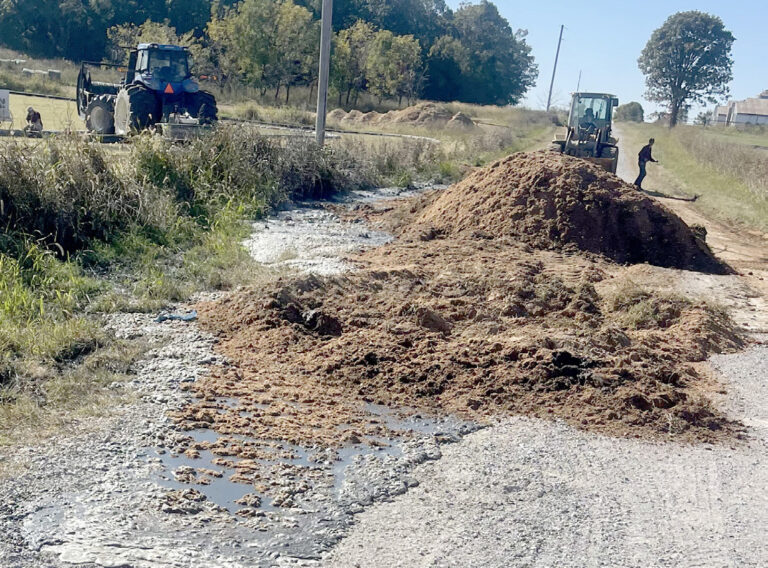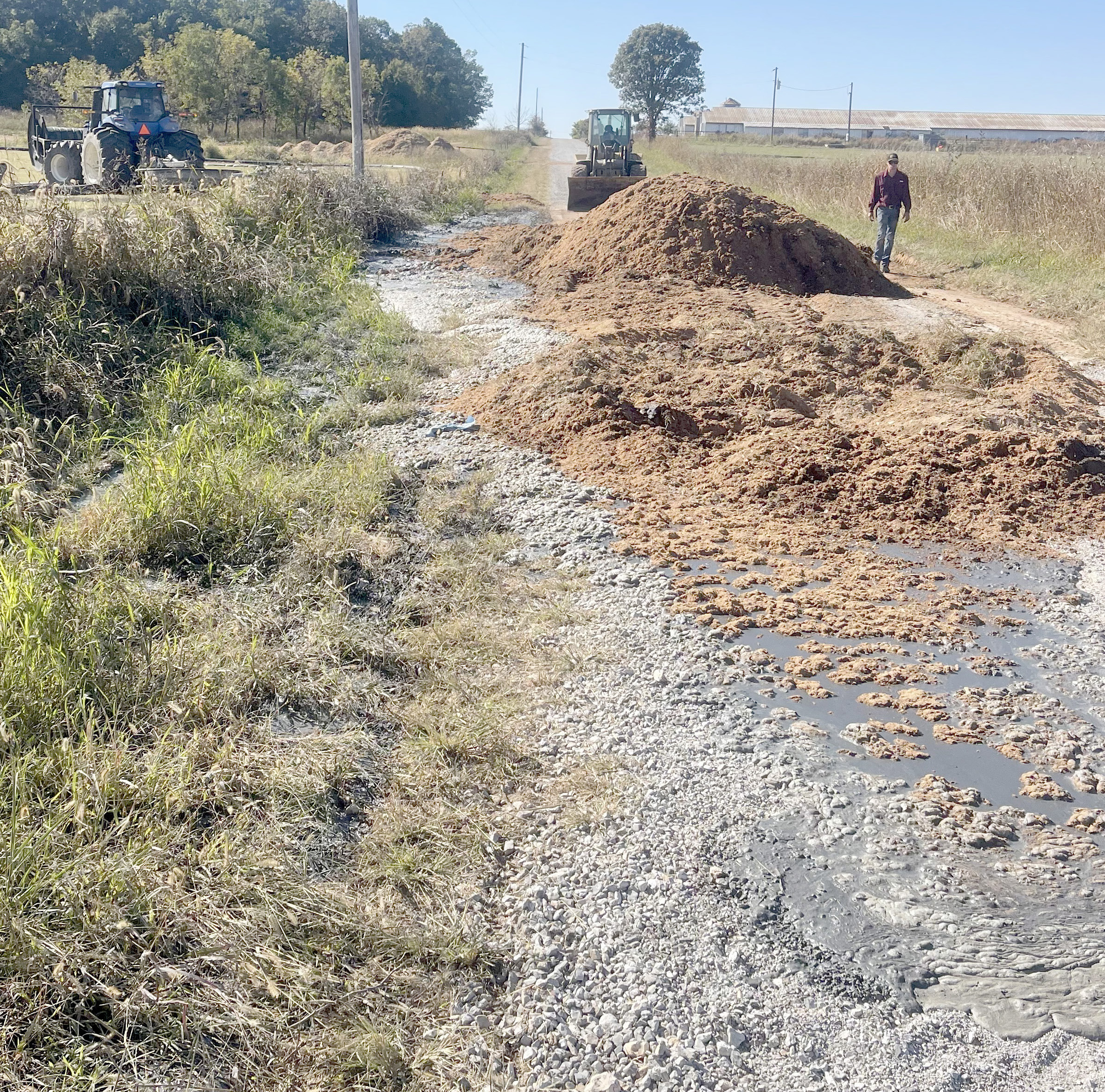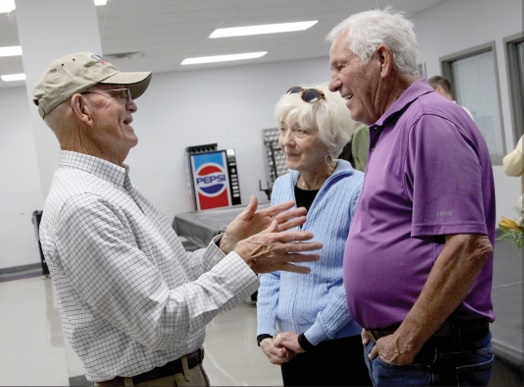Denali cleans up spill


With cases pending judgment in more than one Missouri courtroom, a principal player, Denali Water Solutions, continues to relieve itself of its processing waste in southwest Missouri, an area that has become an apparent legal limbo- land for the effluent once labeled as fertilizer.
In the case of Denali, recorded spills continue to occur.
According to Samuel Liebl, director of communications for Denali, on Oct. 19 at 2 p.m., a break occurred on a hose that was transporting liquid food processing residuals from a storage basin to a field on a farm near Fairview.
“The material was being spread as a fertilizer on cropland,” Liebl said. “Denali estimates that approximately 6,000 gallons of food processing residuals spilled onto the field from the hose break, and that some of the material flowed onto nearby Quince Road.”
Vallerie Steele, a neighbor of Denali’s Evans storage basin near Fairview, where the hose break occurred, was at home when the incident happened.
“It looked like a coupler came loose on the hose when they were pumping the contents out of the lagoon, and the stuff started drowning the field,” Steele said. “They tried to dam it up, and they spread sawdust out to try to stop it, but the pressure was too high.”
According to Steele, the material ran into a dry creek bed, and from there into Quince Road, north of the basin.
Steele said Quince Road was closed while the road department worked through the night to clean up the spill.
“They had to dig into the road to replace rock and dirt,” she said.
State Sen. Jill Carter, R-Granby, was on site Thursday after the spill, where she was in communication with the Missouri Department of Natural Resources (DNR) and representatives of Denali.
“My phone is constantly blowing up with calls from residents with concerns about smells and spills,” Carter said.
Brooks McNeill, with the Southwest Regional Office of the DNR, conducted a follow up investigation on the morning of Oct. 20, confirming that material had been recovered from the spill area and the site had been cleaned.
The Quince Road spill, in Newton County, is not the first for Denali.
Under an Abatement Order of Consent (AOC), the DNR recently fined Denali $15,000 each for two spills in McDonald County that resulted in violations of the Missouri Clean Water Law.
The first violation occurred near Southwest City, in McDonald County, on Aug. 9, 2022, after subcontractors for Denali applied 165,000 gallons of processing waste to land owned by Elbert and Dixie Cantrell.
According to Denali representatives, an intense and unexpected rainfall that night caused the land-applied material to enter a neighboring property.
According to the AOC, an investigation by the DNR on Aug. 11, 2022, confirmed that, from the Cantrell property, the product was discharged into the Cave Springs Branch (Waters of the State) via a culvert underneath McDonald County Highway MM. Department staff observed fertilizer product in Cave Springs Branch downstream of the Cantrell property.
Denali is the defendant in a civil property damage suit related to the incident, in which the plaintiff, Collingsworth Land, LLC, is requesting a jury trial. A pre-trial conference is scheduled for Dec. 5 in the 40th Judicial Circuit Court in Pineville.
In the case of a second recorded spill on March 2, the AOC said DNR staff observed contractors for Denali conducting land application activities on property owned by Rhett Mason, near Stella, in McDonald County, where product was actively discharging from the Mason property into the tributary to Indian Creek.
“In email correspondence with the Department on April 11, 2023, representatives of Denali confirmed that their company had land applied approximately 234,600 gallons of fertilizer product on the Mason property,” the AOC stated.
Denali representatives estimated that a total of 11,040 gallons of fertilizer product were discharged to waters of the state during that incident, of which 4,600 gallons were recovered and 6,440 gallons were unrecovered.
Justin Sherwood, enforcement supervisor with the Water Pollution Control Branch – Compliance and Enforcement Section, said according to law, fines are capped at $10,000 per day, per violation. Denali’s levied fine of $15,000 per incident represents a total of $5,000 for three violations, per incident, Sherwood said.
Violations included discharging without a permit, discharging causing a violation of water quality standards and discharging causing pollution to waters of the state.
At the time of the two spills resulting in violations, the materials, including food processing residuals, were considered fertilizer by the Missouri Fertilizer Control Board (MOFCB). As of July 1, 2023, that status changed.
In April of this year, the MoFCB announced they would no longer issue fertilizer permits to Denali, Synagro and several other companies for the land-application of their waste materials. The reason “boils down to the market value of the residuals,” MoFCB Director Steve Taylor said in April.
“The general intent of the Missouri fertilizer law is to provide consumer protection through truth in labeling and to protect fertilizer customers from experiencing significant economic harm due to the purchase of a fertilizer product that is deficient in essential plant nutrients,” Taylor said. “Since this material is free and has no significant market value, the regulations and requirements of the Missouri fertilizer law do not apply, so a fertilizer permit is not required.”
After the expiration of Denali’s and Synagro’s fertilizer permits on June 30, responsibility for the issuance of land-application permits – as well as oversight of the companies’ practices – shifted to the purview of the DNR. Heather Peters, with the Watershed Protection Section of the DNR, said in April the MoFCB’s decision did not require a change in rule or policy.
“With the removal of the permit exemption, the department’s established permitting rules and procedures will apply,” Peters said at that time.
Peters indicated the application and permitting process could take several months, and that affected companies could continue to operate as long as they intended to meet the DNR’s requirements.
A public notice regarding the land application of processing waste materials is now open for public comment on the department’s website at https://dnr. mo.gov/water/what-weredoing/ public-notices. Residents can comment on the proposed permit, referenced as No-Discharge Land Application of Process Wastes Operating Under Permit Exemption, through December 31, 2023.
Denali and Synagro, however, are not waiting around for the DNR. On July 28, they filed suit against the Missouri Fertilizer Control Board in Cole County Circuit Court in Jefferson City. Their suit alleges that by denying the companies a fertilizer permit, the MoFCB had changed its interpretation of the Missouri Fertilizer Law, although the law had not changed. The case is pending judicial review by Judge Cotton Walker.
While the MoFCB is in Denali’s crosshairs, the DNR is being sued by the Citizens of Randolph County Against Pollution (CRAP), who filed petition in Cole County Circuit Court on Aug. 24. CRAP alleges that the DNR exceeded its statutory authority by permitting Denali to construct a solid waste processing facility in their county without a solid waste management permit.
On Oct. 19, the DNR filed a motion that the suit be dismissed on the grounds that it violates required procedures for the Writ of Prohibition and Preliminary Writ in Prohibition CRAP is requesting.
If CRAP’s suit is successful, it could change the way Denali does business in the entire state of Missouri, if other areas follow CRAP’s lead. The case is pending further action.
Meanwhile, Denali assures residents of Newton County that the materials that ran onto Quince Road Thursday as the result of a broken hose are “food processing residuals [and] are non-hazardous byproducts of wastewater treatment from nearby food facilities.”
“The consistency of the material is similar to a milkshake,” Liebl said. “Because it contains significant amounts of nitrogen, it is a valuable soil amendment for farmers. The state of Missouri regulates the spreading of food processing residuals on farmland, and Denali is authorized at the site near Fairview to carry out the storage and application of the material.
“Denali commends its employees and contractors for acting swiftly and appropriately [when the spill occurred]. They immediately contacted state and local authorities, and they went to work remedying the impacts on Quince Road. The material did not enter any waterways and was vacuumed up by a pumper truck. Denali team members and contractors removed the affected soil from the road, and lime was applied as an additional precaution. Denali and its contractors arranged for gravel to be delivered and spread on Quince Road on the morning of Oct. 20. Work on the road was approved by the Newton County Road Commission.”




